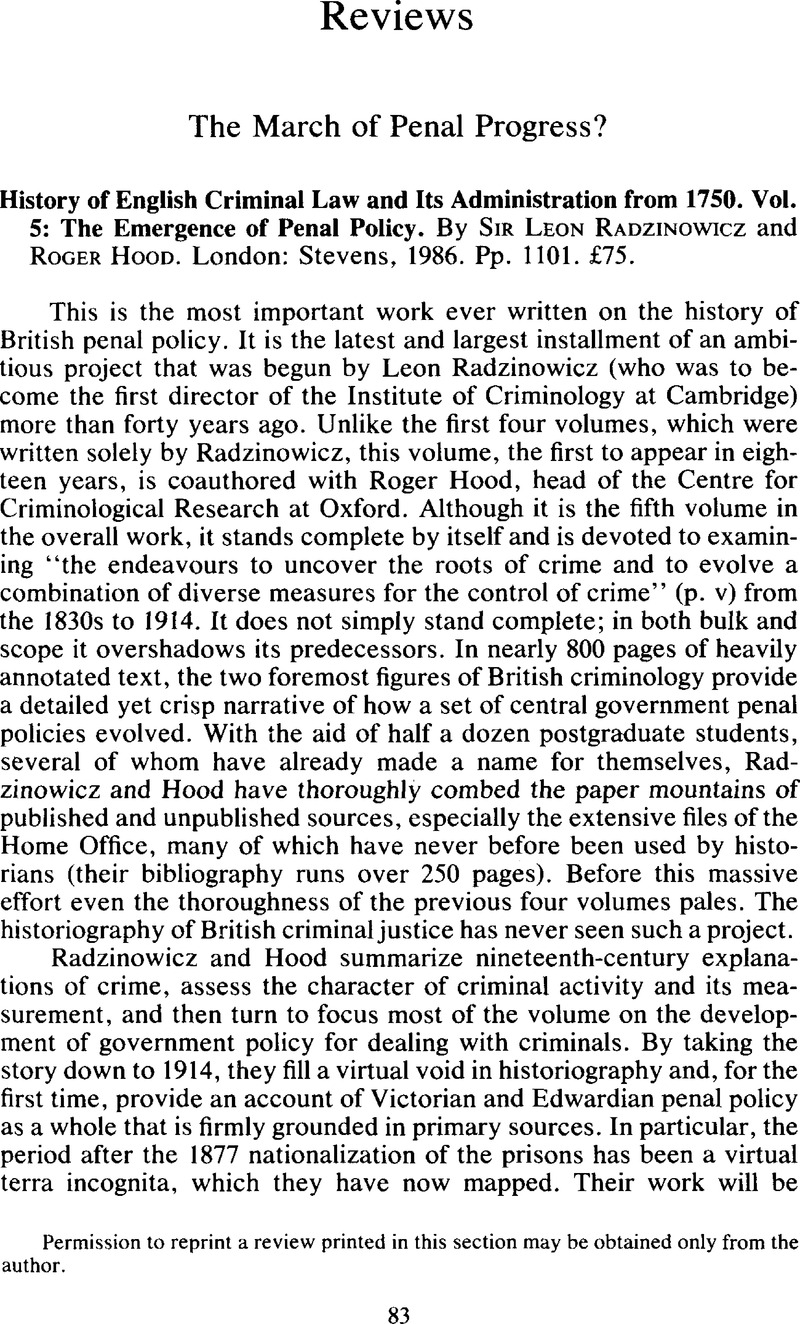No CrossRef data available.
Article contents
The March of Penal Progress? - History of English Criminal Law and Its Administration from 1750. Vol. 5: The Emergence of Penal Policy. By SirLeon Radzinowicz and Roger Hood. London: Stevens, 1986. Pp. 1101. £75.
Published online by Cambridge University Press: 10 January 2014
Abstract

- Type
- Reviews
- Information
- Journal of British Studies , Volume 26 , Issue 1: England's Foreign Relations , January 1987 , pp. 83 - 96
- Copyright
- Copyright © North American Conference of British Studies 1987
References
Permission to reprint a review printed in this section may be obtained only from the author.
1 This work supplements, but also greatly extends in period covered and in range, McConville's, Sean thorough but narrow History of English Prison Administration, 1750–1877 (Boston, 1981), vol. 1Google Scholar. For the current state of the historiography of penal policy, see Bailey, Victor, ed., Policing and Punishment in Nineteenth Century Britain (New Brunswick, N.J., 1981)Google Scholar; Ignatieff, Michael, “State, Civil Society, and Total Institutions: A Critique of Recent Social Histories of Punishment,” in Crime and Justice: An Annual Review of Research, vol. 3, ed. Tonry, Michael and Morris, Norval (Chicago, 1981), pp. 153–92Google Scholar. Philips, David, “‘A Just Measure of Crime, Authority, Hunters and Blue Locusts’: The ‘Revisionist’ Social History of Crime and the Law in Britain, 1780–1850,” in Social Control and the State, ed. Cohen, Stanley and Scull, Andrew (New York, 1983), pp. 50–73Google Scholar; Sugarman, David, Palmer, J. N. J., and Rubin, G. R., “Crime, Law and Authority in Nineteenth Century Britain,” Middlesex Polytechnic History Journal (1983), pp. 28–141Google Scholar; and, most recently, Harding, Christopheret al., Imprisonment in England and Wales: A Concise History (London, 1985)Google Scholar.
2 Humphreys, Sally, “Law as Discourse,” History and Anthropology 1, no. 2 (February 1985): 251CrossRefGoogle Scholar. See esp. Moore, Sally F., Law as Process (London, 1978)Google Scholar; and Comaroff, J. L. and Roberts, S., Rules and Processes (Chicago, 1981)Google Scholar.
3 Perrot, Michelle, “Delinquency and the Penitentiary System in Nineteenth Century France,” in Deviants and the Abandoned in French Society, ed. Forster, Robert and Ranum, Orest (Baltimore, 1978), p. 219Google Scholar.
4 Langbein, John, “Albion's Fatal Flaws,” Past and Present, no. 98 (February 1983), pp. 96–120Google Scholar.
5 If even in a field like medical history—whose subject matter has an undeniable “objective” dimension and whose story is in certain respects at least generally conceded to be progressive—present-minded and internalist forms of explanation have come to be recognized as insufficient, how much more so is this true in the history of criminal policy? This reshaping of medical historiography has gone further in America than in Britain; see, e.g., Rosenberg, Charles and Vogel, Morris, eds., The Therapeutic Revolution: Essays in the Social History of American Medicine (Philadelphia, 1979)Google Scholar; Smith-Rosenberg, Carroll, “The Hysterical Woman: Sex Roles and Role Conflict in Nineteenth-Century America,” in Visions of Gender in Victorian America, ed. Smith-Rosenberg, Carroll (New York, 1985), pp. 197–216Google Scholar; Pernick, Martin S., A Calculus of Suffering: Pain, Professionalism, and Anesthesia in Nineteenth-Century America (New York, 1985)Google Scholar; and, from another direction, Starr, Paul, The Social Transformation of American Medicine (New York, 1982)Google Scholar. On one aspect of British medicine, see Cooter, Roger, The Cultural Meaning of Popular Science: Phrenology and the Organization of Consent in Nineteenth-Century Britain (Cambridge, 1984)Google Scholar.
6 It is significant that Michel Foucault, who for all his irritating imprecision and overreaching raised profound questions, receives in this lengthy work one brief, dismissive mention in a footnote.
7 Gatrell, V. A. G., “The Decline of Theft and Violence in Victorian and Edwardian England,” in Crime and the Law: The Social History of Crime in Western Europe since 1500, ed Gatrell, V., Lenman, B., and Parker, G. (London, 1980), p. 244Google Scholar.
8 This is evidenced by the generally successful demands for sanctions against wife beating, child abuse, and deviant sexuality and for raising the age of consent. See Behlmer, George, Child Abuse and Moral Reform in England, 1870–1908 (Stanford, Calif., 1982)Google Scholar; and Weeks, Jeffrey, Sex, Politics and Society: The Regulation of Sexuality since 1800 (London, 1981)Google Scholar.
9 This is suggested by Garland, David, Punishment and Welfare (Aldershot, 1985)Google Scholar.
10 Quoted in Harrison, Ross, Bentham (London, 1983), p. 139Google Scholar.
11 Quoted in Thomas, William, The Philosophic Radicals (Oxford, 1979), pp. 103–4Google Scholar.
12 Baker, W. Barwick, War with Crime (London, 1889), p. 31–32Google Scholar.
13 Public Record Office, Home Office 45/10027/A56902C/9.
14 The Times (March 26, 1898).




